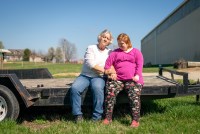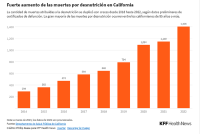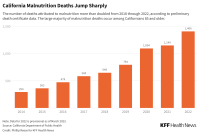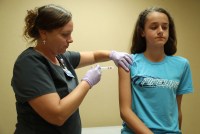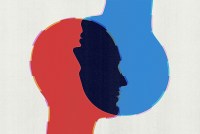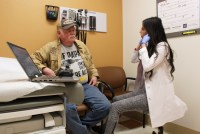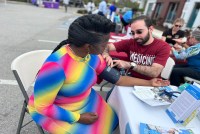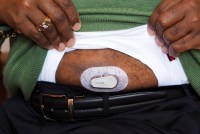Latest Morning Briefing Stories
As Pandemic Emergencies End, People Battling Long Covid Feel ‘Swept Under the Rug’
Millions of Americans suffer from long covid, which can have debilitating physical effects, including fatigue and difficulty breathing. Yet many patients feel they’re on their own.
People With Down Syndrome Are Living Longer, but the Health System Still Treats Many as Kids
The median life expectancy for a U.S. baby born with Down syndrome jumped from about four years in 1950 to 58 years in the 2010s. That’s largely because they no longer can be denied lifesaving care, including surgeries for heart defects. But now, aging adults with Down syndrome face a health system unprepared to care for them.
Journalists Track Opioid Settlement Cash and Fees for Telehealth Visits
KFF Health News and California Healthline staff made the rounds on national and local media this week to discuss their stories. Here’s a collection of their appearances.
A Smart Move on Tax Day: Get Health Insurance Information Using Your State’s Tax Forms
A growing number of states — including Maryland, Colorado, and Massachusetts — are using tax forms to point people toward lower-cost health coverage available through state insurance marketplaces.
What the Health? From KFF Health News: The Confusing Fate of the Abortion Pill
The legality and availability of the abortion pill mifepristone is in question after a federal judge in Texas canceled the FDA’s approval of the first drug used in the two-drug medication abortion regimen. A 5th Circuit Court of Appeals panel overruled that decision in part, saying the pill should remain available, but only under the onerous restrictions in place before 2016. Meanwhile, another federal judge in Washington state issued a ruling in a separate case that conflicts with the Texas decision, ordering the FDA not to roll back any of its restrictions on the drug. Victoria Knight of Axios, Shefali Luthra of The 19th, and Sarah Karlin-Smith of the Pink Sheet join KFF Health News chief Washington correspondent Julie Rovner to discuss these issues and more.
Aumenta el número de californianos mayores que muere por desnutrición
Las muertes atribuidas a la desnutrición aumentaron más del doble, de unas 650 en 2018 a aproximadamente 1,400 en 2022, según datos preliminares de certificados de defunción del Departamento de Salud Pública estatal.
The Rate of Older Californians Dying of Malnutrition Has Accelerated
Californians 85 and older are especially susceptible to malnutrition. They accounted for almost three in five malnutrition deaths in the state last year.
California: proyecto de ley exigiría que estudiantes universitarios se vacunen contra el VPH
Estudios han confirmado que la vacuna contra el VPH reduce el riesgo de desarrollar cáncer en casi un 90% cuando se administra a niñas y niños en la adolescencia temprana, presumiblemente antes de que estén expuestos a cepas peligrosas del virus.
Feds Launch Criminal Investigation Into ‘AGGA’ Dental Device and Its Inventor
KFF Health News and CBS News recently reported that multiple lawsuits allege the device has led to grievous injuries to patients’ mouths, resulting in loss of teeth.
As Montana’s Mental Health Crisis Care Crumbles, Politicians Promise Aid
One of Montana’s largest mental health providers has ratcheted back services amid financial troubles, leaving a vacuum. State policymakers have promised more money to aid behavioral health care, but lasting change could be years out.
California Bill Would Mandate HPV Vaccine for Incoming College Students
A state lawmaker wants all incoming college students to get an HPV vaccine, as part of a push to drive up vaccination rates and prevent cervical cancer. At least four other states have enacted a similar mandate.
Falta de doctores y residencias médicas impactan en la salud de las zonas rurales
Expertos dicen que los factores sistémicos son barreras comunes para establecer y mantener programas de capacitación para médicos en las zonas rurales de Estados Unidos.
Most Americans Say They or a Family Member Has Experienced Gun Violence
More than 1 in 5 Americans report having been threatened with a firearm, and almost as many say they worry about gun violence every day or almost every day, a new KFF poll shows.
Doctor Shortages Distress Rural America, Where Few Residency Programs Exist
Patients in rural northeastern Nevada soon will have fewer providers and resources, after a local hospital decided to close its medical residency program. Nationally, the number of rural residency slots has grown during the past few years but still makes up just 2% of programs and residents nationwide.
Special Medicaid Funds Help Most States, but Prompt Oversight Concerns
Georgia is among 35-plus states that have used an under-the-radar federal funding mechanism to boost payments for hospitals and other providers under Medicaid. But a government watchdog and a congressional advisory commission say sparse oversight makes it hard to tell if the “directed payments” program is meeting its goals.
For Uninsured People With Cancer, Securing Care Can Be Like Spinning a Roulette Wheel
When uninsured people are diagnosed with cancer, accessing resources and paying for treatment can be daunting. The safety nets meant to help often fall short, say cancer physicians and health policy experts who study access to care. Some patients find it easier to play the odds.
Abortion Clinics in Conservative-Led States Face Increasing Legal Threats
Since the U.S. Supreme Court reversed federal protections for abortions, medical providers in conservative-led states have been fighting legal and political battles — as well as escalating threats from the anti-abortion movement.
High Inflation and Housing Costs Force Many Americans to Delay Needed Care
A recent Gallup Poll suggests that Americans are putting off medical care because of costs. Inflation and rising rents make it harder for people to make ends meet.
Montana May Require Insurers to Cover Monitoring Devices for Diabetes
Montana is one of several states considering expanding coverage of continuous glucose monitors, but insurance companies and some providers argue that not all people with diabetes need them.
The Big Squeeze: More Enrollees and Smaller Networks Plague Some ACA Plans
Despite record enrollment in health insurance plans under the Affordable Care Act, some consumers who bought coverage and agents who helped them do so have had a tough start to the new year: Many say it’s hard to find an in-network doctor or hospital.




